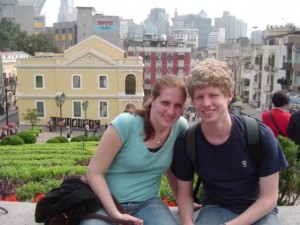
From an early age, Adam Bouland, SM ’09, had a curiosity about the world around him that drew him toward a wide variety of scientific disciplines. At Yale, he is double-majoring in physics and the joint computer science and mathematics program.
Now, he speculates that it was a “fairly strong depth of research” that helped him become one of only forty eight Yalies ever to receive the prestigious Barry M. Goldwater Scholarship, bestowed upon undergraduates studying engineering, mathematics, or natural sciences.
Following his junior year of high school, Bouland began work at the Army Research Lab in computational mechanics, a field that uses computers to simulate structural dynamics. There, Bouland was able to develop his research skills under the guidance of Dr. Mostafiz Chowdhury, who inspired him to remain working at the lab for three summers.
“I’m always looking for ways to apply mathematics and computation to the real world,” Bouland said. At the Army Research Laboratory, he was able to do precisely this, working on projects dealing with the structural dynamics of shock in relation to projectiles and vehicle impacts.
Bouland’s passion for his work was evident, as his findings were not only published at the Army Research Lab but also presented at the National Conference of Computational Mechanics in 2005 and at the International Symposium on Plasticity in 2007.
Expanding upon his Army Research Laboratory experience, Bouland has been part of a number of other projects throughout his undergraduate career. Working with a structural geology group at Stanford University the summer following his sophomore year, he was able to apply his skills in computational mechanics to a new set of questions.
“We were using mathematical methods to explore the ways in which faults can grow,” he explained. Last summer, Bouland worked at Oracle, using discrete mathematics to study supply chain planning – a position that was “a little different” from his previous summer experiences, he recalls.
On Yale’s campus, Bouland’s diverse research interests have ranged from projects in the department of engineering to the physics department. In engineering, Bouland studied the behavior of bulk metallic glass, a type of metallic material with an amorphous molecular structure.
Currently, his focus is cosmology, as he seeks to use statistical methods to understand the cosmic microwave background, a term referring to the ever-present background radiation in the universe. This information is particularly interesting, he says, as it may “tell us about the physics of the early universe.”
In addition to his research experience, Bouland has been an active member of the Yale community in other ways. In spring 2008, he participated in the YUNA exchange program, hosting students from Hong Kong and traveling to Asia over spring break.
As the technical director of Engineers without Borders, he worked on a water-delivery project in Kikoo, a rural village in Cameroon, where he has traveled several times since the project began in summer 2007. Bouland is also a member of the Conservative Party of the Yale Political Union, and he plays percussion in the Yale Concert Band.
Bouland plans to attend graduate school, beginning with two years at Cambridge as a 2009 Marshall Scholar, the only one from Yale. “I’m planning to go into theoretical physics,” he said; at Cambridge, he will be studying math and physics.
Progressing from research in computational mechanics to physics, Bouland realizes that his current higher educational goals reflect the growth of his intellectual, academic, and research interests. His explanation for his complex interests is simple: “I like seeing advanced mathematical concepts appear in the real world.”
